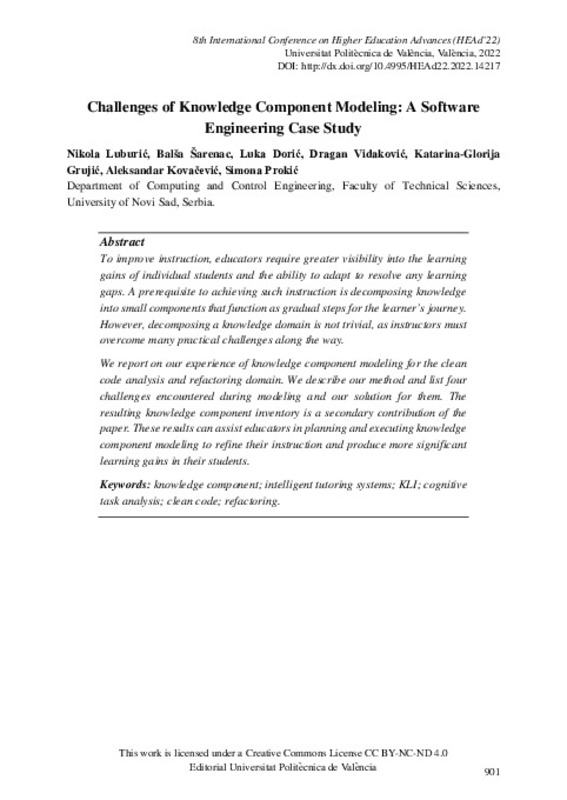JavaScript is disabled for your browser. Some features of this site may not work without it.
Buscar en RiuNet
Listar
Mi cuenta
Estadísticas
Ayuda RiuNet
Admin. UPV
Challenges of Knowledge Component Modeling: A Software Engineering Case Study
Mostrar el registro sencillo del ítem
Ficheros en el ítem
| dc.contributor.author | Luburić, Nikola
|
es_ES |
| dc.contributor.author | Šarenac, Balša
|
es_ES |
| dc.contributor.author | Dorić, Luka
|
es_ES |
| dc.contributor.author | Vidaković, Dragan
|
es_ES |
| dc.contributor.author | Grujić, Katarina-Glorija
|
es_ES |
| dc.contributor.author | Kovačević, Aleksandar
|
es_ES |
| dc.contributor.author | Prokić, Simona
|
es_ES |
| dc.date.accessioned | 2023-02-15T08:40:54Z | |
| dc.date.available | 2023-02-15T08:40:54Z | |
| dc.date.issued | 2022-05-31 | |
| dc.identifier.isbn | 9788413960036 | |
| dc.identifier.issn | 2603-5871 | |
| dc.identifier.uri | http://hdl.handle.net/10251/191847 | |
| dc.description.abstract | [EN] To improve instruction, educators require greater visibility into the learning gains of individual students and the ability to adapt to resolve any learning gaps. A prerequisite to achieving such instruction is decomposing knowledge into small components that function as gradual steps for the learner’s journey. However, decomposing a knowledge domain is not trivial, as instructors must overcome many practical challenges along the way. We report on our experience of knowledge component modeling for the clean code analysis and refactoring domain. We describe our method and list four challenges encountered during modeling and our solution for them. The resulting knowledge component inventory is a secondary contribution of the paper. These results can assist educators in planning and executing knowledge component modeling to refine their instruction and produce more significant learning gains in their students. | es_ES |
| dc.format.extent | 8 | es_ES |
| dc.language | Inglés | es_ES |
| dc.publisher | Editorial Universitat Politècnica de València | es_ES |
| dc.relation.ispartof | 8th International Conference on Higher Education Advances (HEAd'22) | |
| dc.rights | Reconocimiento - No comercial - Sin obra derivada (by-nc-nd) | es_ES |
| dc.subject | Knowledge component | es_ES |
| dc.subject | Intelligent tutoring systems | es_ES |
| dc.subject | KLI | es_ES |
| dc.subject | Cognitive task analysis | es_ES |
| dc.subject | Clean code | es_ES |
| dc.subject | Refactoring | es_ES |
| dc.title | Challenges of Knowledge Component Modeling: A Software Engineering Case Study | es_ES |
| dc.type | Capítulo de libro | es_ES |
| dc.type | Comunicación en congreso | es_ES |
| dc.identifier.doi | 10.4995/HEAd22.2022.14217 | |
| dc.rights.accessRights | Abierto | es_ES |
| dc.description.bibliographicCitation | Luburić, N.; Šarenac, B.; Dorić, L.; Vidaković, D.; Grujić, K.; Kovačević, A.; Prokić, S. (2022). Challenges of Knowledge Component Modeling: A Software Engineering Case Study. En 8th International Conference on Higher Education Advances (HEAd'22). Editorial Universitat Politècnica de València. 901-908. https://doi.org/10.4995/HEAd22.2022.14217 | es_ES |
| dc.description.accrualMethod | OCS | es_ES |
| dc.relation.conferencename | Eighth International Conference on Higher Education Advances | es_ES |
| dc.relation.conferencedate | Junio 14-17, 2022 | es_ES |
| dc.relation.conferenceplace | Valencia, España | es_ES |
| dc.relation.publisherversion | http://ocs.editorial.upv.es/index.php/HEAD/HEAd22/paper/view/14217 | es_ES |
| dc.description.upvformatpinicio | 901 | es_ES |
| dc.description.upvformatpfin | 908 | es_ES |
| dc.type.version | info:eu-repo/semantics/publishedVersion | es_ES |
| dc.relation.pasarela | OCS\14217 | es_ES |








